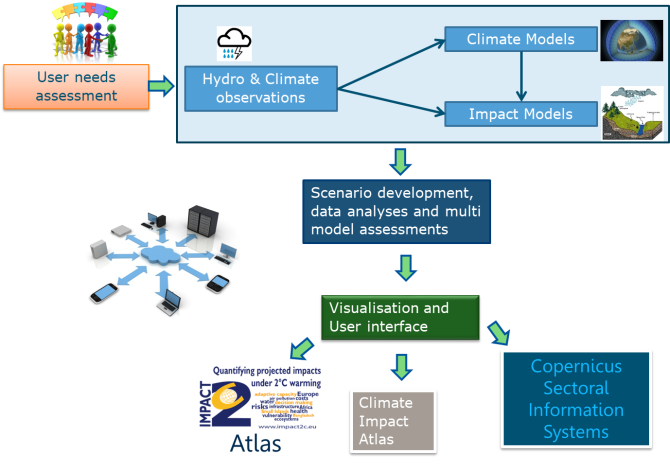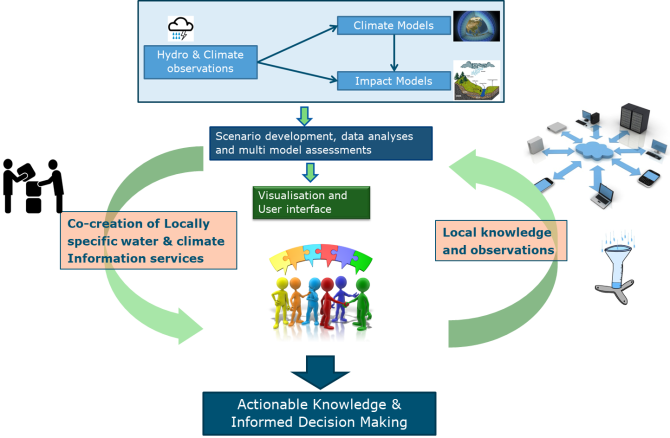Climate Information Services
Sectors such as farming and tourism need to adapt to climate change. But at present, they cannot use the information about climate change to do so because it is on too broad a scale or is not easily accessible. Now WIMEK is developing climate information services in collaboration with these users to create actionable knowledge.
Background
Over the past 20 years it has become increasingly clear that climate change will have a severe impact on our environment. Climate change impact assessments initially focused on ‘warning’ the world about the potentially devastating effects and on guiding mitigation policies. Now it is clear that climate change is inevitable, adaptation strategies are required too. However, the climate change data that is needed to develop such strategies is often not available, accessible, usable or easy to interpret. That is why WIMEK is developing climate information services.
Research objectives and approach
We have two key research objectives:
- To quantify the impact of climate variability and climate change on water, food production and the rural and urban environment.
- To communicate this information to a wider audience, and co-create actionable knowledge through the development of climate information services.
Our research approach has evolved over time. The first generation of climate information services (see Figure 1) focused on integrating climate models and data in new frameworks, with the aim of better understanding climate effects. This resulted in high-impact publications but the information was of limited use to users: it was too uncertain, not at the right spatial scale and was projected too far into the future.

These limitations triggered us to develop a second generation of climate services (see Figure 2). This new approach focuses on co-development and co-learning, in a process that puts the users centre stage. The advantage is that the resulting climate services deliver actionable knowledge that lets users take decisions.

Stakeholder involvement
From the beginning, we have worked with national and international policy makers, for example river basin management authorities, the EU, Intergovernmental Panel on Climate Change (IPCC) and Food and Agriculture Organization (FAO). With the shift over the past five years to a co-development approach, the range of stakeholders we work with has expanded to include farmers, NGOs and the private sector.
Link to education
Our research on climate information services informs student education. There are strong links with the Climate Studies Master’s, the Earth & Environment Master’s and the BSc minor Climate Change Mitigation & Adaptation. In our projects in Africa and Asia, we work with local universities and educate PhD students from the region.
Research highlights
The work of Climate Information Services has resulted in a large number of highly-cited papers in prestigious journals. The work is also highly valued by research funders, as is demonstrated by the large number of research grants from organizations including the Dutch Research Council, the EU and Rabobank. The respect we enjoy among our peers is also evidenced by our many collaborations with universities and meteorological institutes around the world.
At the local level, we have co-developed apps with local farmers in Ghana and Bangladesh in the EVOCA and WaterApps projects. These services integrated local, indigenous knowledge with global scientific knowledge on climate and weather to help the farmers improve agricultural production and prepare for extreme events.
At the regional and global scales, climate information systems have been developed for the water, agriculture and tourism sectors. Together with users we studied how the Copernicus Climate Change Service can provide tailored products in the different sectors. We developed a global data and modelling platform in combination with novel visualization tools to make the climate data usable to key users in the public and private sectors.
Impact
In terms of societal impacts, our work has informed national, international (EU, UN) and regional policymakers. We have contributed to the IPCC and a range of other policy documents on climate change services, impacts and adaptation. In addition, our climate services have helped local government, businesses (such as Thomas Cook, Heineken and the PGM pension fund), and local farmers to better manage their climate risks. In a tangible example, our climate service with a seven-day cyclone warning developed in Bangladesh helped farmers prepare for cyclones and warn relatives. As a result, they suffered much less material and financial damage from the cyclone.